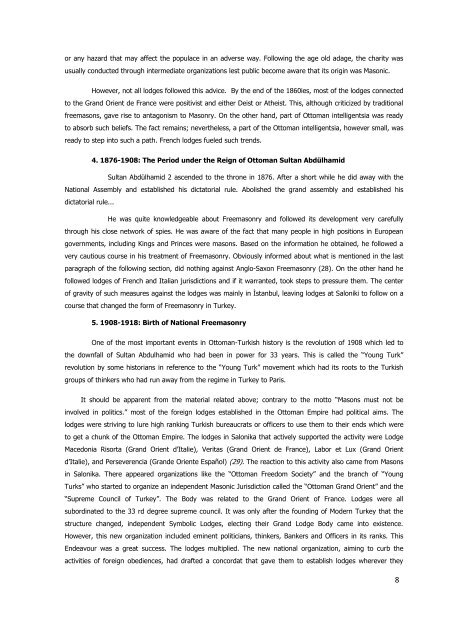A Concise History of Freemasonry in the Ottoman Empire Altay ...
A Concise History of Freemasonry in the Ottoman Empire Altay ...
A Concise History of Freemasonry in the Ottoman Empire Altay ...
You also want an ePaper? Increase the reach of your titles
YUMPU automatically turns print PDFs into web optimized ePapers that Google loves.
or any hazard that may affect <strong>the</strong> populace <strong>in</strong> an adverse way. Follow<strong>in</strong>g <strong>the</strong> age old adage, <strong>the</strong> charity was<br />
usually conducted through <strong>in</strong>termediate organizations lest public become aware that its orig<strong>in</strong> was Masonic.<br />
However, not all lodges followed this advice. By <strong>the</strong> end <strong>of</strong> <strong>the</strong> 1860ies, most <strong>of</strong> <strong>the</strong> lodges connected<br />
to <strong>the</strong> Grand Orient de France were positivist and ei<strong>the</strong>r Deist or A<strong>the</strong>ist. This, although criticized by traditional<br />
freemasons, gave rise to antagonism to Masonry. On <strong>the</strong> o<strong>the</strong>r hand, part <strong>of</strong> <strong>Ottoman</strong> <strong>in</strong>telligentsia was ready<br />
to absorb such beliefs. The fact rema<strong>in</strong>s; never<strong>the</strong>less, a part <strong>of</strong> <strong>the</strong> <strong>Ottoman</strong> <strong>in</strong>telligentsia, however small, was<br />
ready to step <strong>in</strong>to such a path. French lodges fueled such trends.<br />
4. 1876-1908: The Period under <strong>the</strong> Reign <strong>of</strong> <strong>Ottoman</strong> Sultan Abdülhamid<br />
Sultan Abdülhamid 2 ascended to <strong>the</strong> throne <strong>in</strong> 1876. After a short while he did away with <strong>the</strong><br />
National Assembly and established his dictatorial rule. Abolished <strong>the</strong> grand assembly and established his<br />
dictatorial rule...<br />
He was quite knowledgeable about <strong>Freemasonry</strong> and followed its development very carefully<br />
through his close network <strong>of</strong> spies. He was aware <strong>of</strong> <strong>the</strong> fact that many people <strong>in</strong> high positions <strong>in</strong> European<br />
governments, <strong>in</strong>clud<strong>in</strong>g K<strong>in</strong>gs and Pr<strong>in</strong>ces were masons. Based on <strong>the</strong> <strong>in</strong>formation he obta<strong>in</strong>ed, he followed a<br />
very cautious course <strong>in</strong> his treatment <strong>of</strong> <strong>Freemasonry</strong>. Obviously <strong>in</strong>formed about what is mentioned <strong>in</strong> <strong>the</strong> last<br />
paragraph <strong>of</strong> <strong>the</strong> follow<strong>in</strong>g section, did noth<strong>in</strong>g aga<strong>in</strong>st Anglo-Saxon <strong>Freemasonry</strong> (28). On <strong>the</strong> o<strong>the</strong>r hand he<br />
followed lodges <strong>of</strong> French and Italian jurisdictions and if it warranted, took steps to pressure <strong>the</strong>m. The center<br />
<strong>of</strong> gravity <strong>of</strong> such measures aga<strong>in</strong>st <strong>the</strong> lodges was ma<strong>in</strong>ly <strong>in</strong> İstanbul, leav<strong>in</strong>g lodges at Saloniki to follow on a<br />
course that changed <strong>the</strong> form <strong>of</strong> <strong>Freemasonry</strong> <strong>in</strong> Turkey.<br />
5. 1908-1918: Birth <strong>of</strong> National <strong>Freemasonry</strong><br />
One <strong>of</strong> <strong>the</strong> most important events <strong>in</strong> <strong>Ottoman</strong>-Turkish history is <strong>the</strong> revolution <strong>of</strong> 1908 which led to<br />
<strong>the</strong> downfall <strong>of</strong> Sultan Abdulhamid who had been <strong>in</strong> power for 33 years. This is called <strong>the</strong> “Young Turk”<br />
revolution by some historians <strong>in</strong> reference to <strong>the</strong> “Young Turk” movement which had its roots to <strong>the</strong> Turkish<br />
groups <strong>of</strong> th<strong>in</strong>kers who had run away from <strong>the</strong> regime <strong>in</strong> Turkey to Paris.<br />
It should be apparent from <strong>the</strong> material related above; contrary to <strong>the</strong> motto “Masons must not be<br />
<strong>in</strong>volved <strong>in</strong> politics.” most <strong>of</strong> <strong>the</strong> foreign lodges established <strong>in</strong> <strong>the</strong> <strong>Ottoman</strong> <strong>Empire</strong> had political aims. The<br />
lodges were striv<strong>in</strong>g to lure high rank<strong>in</strong>g Turkish bureaucrats or <strong>of</strong>ficers to use <strong>the</strong>m to <strong>the</strong>ir ends which were<br />
to get a chunk <strong>of</strong> <strong>the</strong> <strong>Ottoman</strong> <strong>Empire</strong>. The lodges <strong>in</strong> Salonika that actively supported <strong>the</strong> activity were Lodge<br />
Macedonia Risorta (Grand Orient d‟Italie), Veritas (Grand Orient de France), Labor et Lux (Grand Orient<br />
d‟Italie), and Perseverencia (Grande Oriente Español) (29). The reaction to this activity also came from Masons<br />
<strong>in</strong> Salonika. There appeared organizations like <strong>the</strong> “<strong>Ottoman</strong> Freedom Society” and <strong>the</strong> branch <strong>of</strong> “Young<br />
Turks” who started to organize an <strong>in</strong>dependent Masonic Jurisdiction called <strong>the</strong> “<strong>Ottoman</strong> Grand Orient” and <strong>the</strong><br />
“Supreme Council <strong>of</strong> Turkey”. The Body was related to <strong>the</strong> Grand Orient <strong>of</strong> France. Lodges were all<br />
subord<strong>in</strong>ated to <strong>the</strong> 33 rd degree supreme council. It was only after <strong>the</strong> found<strong>in</strong>g <strong>of</strong> Modern Turkey that <strong>the</strong><br />
structure changed, <strong>in</strong>dependent Symbolic Lodges, elect<strong>in</strong>g <strong>the</strong>ir Grand Lodge Body came <strong>in</strong>to existence.<br />
However, this new organization <strong>in</strong>cluded em<strong>in</strong>ent politicians, th<strong>in</strong>kers, Bankers and Officers <strong>in</strong> its ranks. This<br />
Endeavour was a great success. The lodges multiplied. The new national organization, aim<strong>in</strong>g to curb <strong>the</strong><br />
activities <strong>of</strong> foreign obediences, had drafted a concordat that gave <strong>the</strong>m to establish lodges wherever <strong>the</strong>y<br />
8


